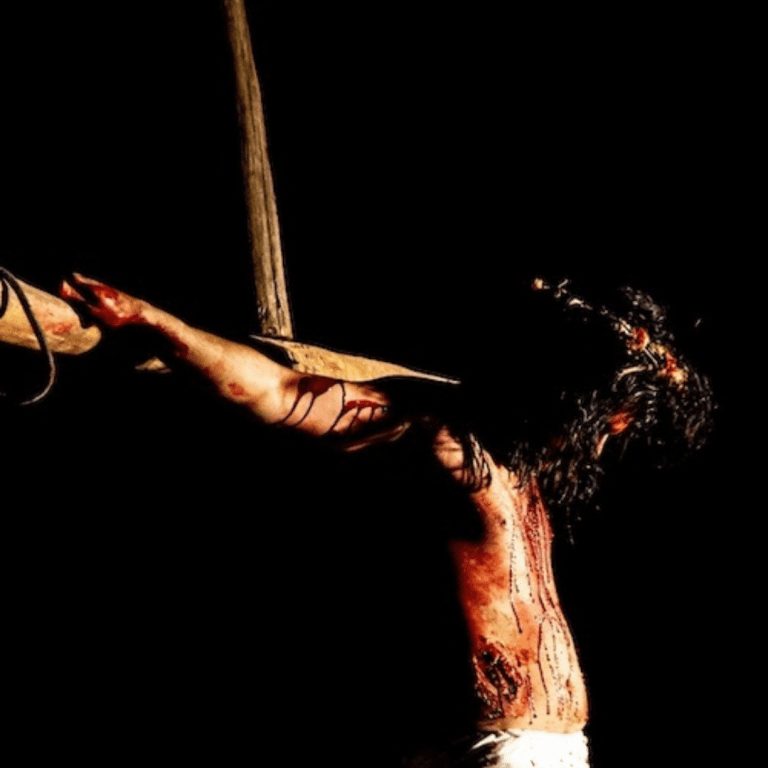The Great Banquet
(Luke 14.15-24)1 Once again Jesus used stories to teach the people:
2 The kingdom of heaven is like what happened when a king gave a wedding banquet for his son. 3 The king sent some servants to tell the invited guests to come to the banquet, but the guests refused. 4 He sent other servants to say to the guests, “The banquet is ready! My cattle and prize calves have all been prepared. Everything is ready. Come to the banquet!”
5 But the guests did not pay any attention. Some of them left for their farms, and some went to their places of business. 6 Others grabbed the servants, then beat them up and killed them.
7 This made the king so furious that he sent an army to kill those murderers and burn down their city. 8 Then he said to the servants, “It is time for the wedding banquet, and the invited guests don't deserve to come. 9 Go out to the street corners and tell everyone you meet to come to the banquet.” 10 They went out on the streets and brought in everyone they could find, good and bad alike. And the banquet room was filled with guests.
11 When the king went in to meet the guests, he found that one of them wasn't wearing the right kind of clothes for the wedding. 12 The king asked, “Friend, why didn't you wear proper clothes for the wedding?” But the guest had no excuse. 13 So the king gave orders for this person to be tied hand and foot and to be thrown outside into the dark. That's where people will cry and grit their teeth in pain. 14 Many are invited, but only a few are chosen.
Paying Taxes
(Mark 12.13-17Luke 20.20-26)15 The Pharisees got together and planned how they could trick Jesus into saying something wrong. 16 They sent some of their followers and some of Herod's followers to say to him, “Teacher, we know that you are honest. You teach the truth about what God wants people to do. And you treat everyone with the same respect, no matter who they are. 17 Tell us what you think! Should we pay taxes to the Emperor or not?”
18 Jesus knew their evil thoughts and said, “Why are you trying to test me? You show-offs! 19 Let me see one of the coins used for paying taxes.” They brought him a silver coin, 20 and he asked, “Whose picture and name are on it?”
21 “The Emperor's,” they answered.
Then Jesus told them, “Give the Emperor what belongs to him and give God what belongs to God.” 22 His answer surprised them so much that they walked away.
Life in the Future World
(Mark 12.18-27Luke 20.27-40)23 The Sadducees did not believe people would rise to life after death. So that same day some of the Sadducees came to Jesus and said:
24 Teacher, Moses wrote that if a married man dies and has no children, his brother should marry the widow. Their first son would then be thought of as the son of the dead brother.
25 Once there were seven brothers who lived here. The first one married, but died without having any children. So his wife was left to his brother. 26 The same thing happened to the second and third brothers and finally to all seven of them. 27 At last the woman died. 28 When God raises people from death, whose wife will this woman be? She had been married to all seven brothers.
29 Jesus answered:
You are completely wrong! You don't know what the Scriptures teach. And you don't know anything about the power of God. 30 When God raises people to life, they won't marry. They will be like the angels in heaven. 31 And as for people being raised to life, God was speaking to you when he said, 32 “I am the God worshiped by Abraham, Isaac, and Jacob.” He isn't the God of the dead, but of the living.
33 The crowds were surprised to hear what Jesus was teaching.
The Most Important Commandment
(Mark 12.28-34Luke 10.25-28)34 After Jesus had made the Sadducees look foolish, the Pharisees heard about it and got together. 35 One of them was an expert in the Jewish Law. So he tried to test Jesus by asking, 36 “Teacher, what is the most important commandment in the Law?”
37 Jesus answered:

Love the Lord your God with all your heart, soul, and mind. 38 This is the first and most important commandment. 39 The second most important commandment is like this one. And it is, “Love others as much as you love yourself.” 40 All the Law of Moses and the Books of the Prophets are based on these two commandments.
About David's Son
(Mark 12.35-37Luke 20.41-44)41 While the Pharisees were still there, Jesus asked them, 42 “What do you think about the Messiah? Whose family will he come from?”
They answered, “He will be a son of King David.”
43 Jesus replied, “How then could the Spirit lead David to call the Messiah his Lord? David said,
44 ‘The Lord said to my Lord:
Sit at my right side
until I make your enemies
into a footstool for you.’
45 If David called the Messiah his Lord, how can the Messiah be a son of King David?” 46 No one was able to give Jesus an answer, and from that day on, no one dared ask him any more questions.
Maañoobiti feetoo la mansaaloo
(Luka 14:15-24)1 Yeesu diyaamuta ì ye mansaaloolu la kotenke ka a fo ì ye ko: 2 “Arijana mansabaayaa si misaali noo mansakewo le la, meŋ ye maañoobiti feetoo parendi a dinkewo ye. 3 A ye a la dookuulaalu kii ka moolu bee kumandi, a ye mennu buuñaatoo kili ñiŋ feetoo to. Bari ì maŋ soŋ ka naa. 4 A ye dookuulaa doolu kii kotenke, a ko ì ye ko, ‘Ali a fo moolu ye, ŋa mennu kili ko: A juubee, ŋa n na domoroo parendi le. Ŋa n na ninsituuraalu kanateyi le, aniŋ n na ninsiriŋ batundoolu, aduŋ kuwolu bee pareeta le, ali ye naa maañoobitoo to.’
5 “Bari ì maŋ a danku, ì taata ì la haajoolu la. Doolu taata ì la kunkoolu to, doolu taata ì la fiiridulaalu to. 6 Doolu ye a la dookuulaalu muta, ì ye ì ŋayibe aniŋ ì ye ì faa. 7 Wo kamma la mansakewo kamfaata baake. A ye a la kelediŋolu kii ka wo moofaalaalu bee faa, aniŋ ka ì la saatewo jani. 8 Wo to le a ko a la dookuulaalu ye ko, ‘Tooñaa, maañoobiti feetoo pareeta le, bari moolu, ŋa mennu buuñaatoo kili jee, wolu maŋ jari a la. 9 Wo kamma la ali taa mbeedi kumbeŋolu to, ali ye moo-wo-moo je, ali si a kili naŋ feetoo to.’
10 “Bituŋ wo dookuulaalu taata mbeedoolu kaŋ taariŋ, ì ye moolu bee kafu ñoo ma, ì ye mennu je, moo kuruŋolu niŋ moo betoolu. Bituŋ maañoobiti feetoo buŋo faata niŋ luntaŋolu la.
11 “Bari kabiriŋ mansakewo naata ka luntaŋolu juubee, a ye kewo je jee, meŋ maŋ maañoobiti feŋolu duŋ. 12 A ko a ye ko, ‘N teeri, i dunta jaŋ ñaadii le, i maŋ maañoobiti feŋolu duŋ?’ Kewo be deyiriŋ. 13 Wo to le mansakewo ko a la dookuulaalu ye ko, ‘Ali a siŋolu niŋ a buloolu siti, ali ye a fayi banta diboo kono, kumboo niŋ nimisoo be daameŋ.’
14 “Kaatu moo jamaa le kumandita, bari moo dantaŋ ne tombonta.”
Naamujoo la kuwo ñininkaaroo
(Maaka 12:13-17Luka 20:20-26)15 Wo to le Farisewolu* taata ka feeroo siti, ì be Yeesu muta la a la kumoo kono ñaameŋ. 16 Bituŋ ì ye ì la taaliboolu kii a kaŋ, aniŋ Herodi la kafoo moo doolu, ka a fo a ye ko, “Karammoo, ŋà a loŋ ne ko, ite mu tooñaa moo le ti, aduŋ i ka Alla la siloo le karandi tooñaa kono. Moo-wo-moo le buka ite jenkendi noo, kaatu ite buka moo faasaa. 17 Wo kamma la, i la miiroo yitandi ñiŋ kuwo to: Fo siloo le mu baŋ, ka naamoo joo Rooma bankoo la mansa* yaa, waraŋ fo siloo nte?”
18 Bari Yeesu ye ì la feere kuruŋo loŋ ne, bituŋ a ko ì ye ko, “Alitolu bunaafayoolu, muŋ ne ye a tinna ali ka n kotobo? 19 Ali kodicoroosoo yitandi n na, ali ka naamoo joo meŋ na.” Bituŋ ì ye denaari kiliŋ samba a ye naŋ. 20 Wo to le Yeesu ye ì ñininkaa ko, “Jumaa le nataaloo niŋ a too be ñiŋ bala?” 21 Ì ye a jaabi ko, “Rooma bankoo la mansa le mu.” Wo to le a ko ì ye ko, “Meŋ mu mansa taa ti, ali wo dii mansa la. Meŋ mu Alla taa ti, ali ye wo dii Alla la.”
22 Kabiriŋ ì ye ñiŋ kumoolu moyi, ì jaakalita. Bituŋ ì ye a bula, ì taata.
Saayaakoolaa wulindiroo la kuwo ñininkaaroo
(Maaka 12:18-27Luka 20:27-40)23 Wo luŋ kiliŋo la Sadusewolu* naata a kaŋ, mennu ka a fo ko, saayaakoolaa wulindiroo te keriŋ. Ì ye a ñininkaa ko, 24 “Karammoo, Annabilayi Musa ye ñiŋ ne fo ko, niŋ kewo faata, aduŋ a maŋ diŋolu soto, a baadiŋo ñanta a la musoo futuu la le ka diŋolu wuluu a ye. 25 Saayiŋ, baadimmaa woorowula le tarata m̀ fee nuŋ. Foloo futuuta le, bituŋ a naata faa. Baawo a maŋ diŋolu soto, a ye a la musoo tu a doomaa bulu. 26 Wo kuu kiliŋo le keta fulanjaŋo fanaa la, aniŋ sabanjaŋo fo woorowulanjaŋo to. 27 Labaŋo la musoo fanaa faata. 28 Saayiŋ, saayaakoolaa wulindiroo luŋo la, a be ke la jumaa le la musoo ti ñiŋ baadimmaa woorowuloo kono? Baawo woorowuloo bee ye a futuu le!”
29 Yeesu ye ì jaabi ko, “Ali filita le, kaatu ali maŋ Kitaabu Senuŋolu loŋ sako Alla la semboo. 30 Saayaakoolaa wulindiroo, futuu te jee sako ka moo futundi, bari ì be muluŋ na le ko malaayikoolu Arijana kono.
31 “Bari furewolu la wulindiroo la kuwo to, fo ali nene maŋ a karaŋ baŋ, Alla ye meŋ fo ali ye? A ko, 32 ‘Nte le mu Iburayima la Alla ti, Isiyaaka la Alla, aniŋ Yaakuba la Alla.’ A maŋ ke furewolu la Alla ti, bari baluuriŋolu.” 33 Kabiriŋ moo jamaa ye ñiŋ moyi, ì jaakalita a la karandiroo la.
Yaamaroo meŋ warata yaamaroolu bee ti
(Maaka 12:28-34Luka 10:25-28)34 Kabiriŋ Farisewolu ye a moyi ko, Yeesu ye Sadusewolu deyindi le, ì kafuta ñoo ma. 35 Bituŋ kiliŋ be ì kono, meŋ mu Luwaa lonnaa ti, a ye Yeesu ñininkaa ka a kotobo, 36 “Karammoo, yaamari jumaa le warata yaamaroolu bee ti Luwaa kono?” 37 Bituŋ Yeesu ye a jaabi ko, “I si Maariyo, i la Alla kanu i sondomoo bee la, i niyo bee la, aniŋ i hakiloo bee la. 38 Ñiŋ ne mu yaamari foloo ti, aduŋ ate le warata yaamaroolu bee ti. 39 Fulanjaŋo meŋ kummaayaata ko foloo, mu ñiŋ ne ti, ‘I si i siiñoo kanu ko i faŋo.’ 40 Luwaa bee aniŋ annabiyomoolu la karandiroo be dendiŋ ñiŋ yaamari fuloo le la.”
Alimasiihu mu jumaa le dinkewo ti?
(Maaka 12:35-37Luka 20:41-44)41 Kabiriŋ Farisewolu be bendiŋ ñoo kaŋ, Yeesu ye ì ñininkaa, 42 “Ali ye muŋ ne miira Alimasiihu* la kuwo to? Jumaa le dinkewo mu?” Ì ye a jaabi ko, “Dawuda le dinkewo mu.” 43 Bituŋ a ko ì ye ko, “Wo to, muŋ ne ye a tinna Dawuda ka a kumandi ‘m Maarii’ la, kabiriŋ a diyaamuta ka bo niŋ Alla la Nooroo la ko:
44 Maariyo ko m Maarii ye le ko,
‘Sii m bulubaa karoo la,
fo ŋa i jawoolu ke i siŋo koto.’
45 “Niŋ Dawuda ye a kumandi a Maariyo la, wo to a si ke noo Dawuda dinkewo ti ñaadii le?”
46 Bari moo maŋ a jaabi noo hani kuma kiliŋ na, sako moo si haañi ka a ñininkaa kuma doo la ka bo wo luŋo la.


